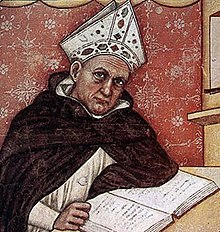St. Albert the Great
| Saint Albertus Magnus, O.P. | |
|---|---|

Saint Albertus Magnus, a fresco by Tommaso da Modena (1352), Church of San Nicolò, Treviso, Italy
|
|
| Religious, Bishop, and Doctor of the Church | |
| Born | c. 1200 Lauingen, Duchy of Bavaria |
| Died | November 15, 1280 Cologne, Holy Roman Empire |
| Venerated in | Catholic Church |
| Beatified | 1622, Rome, Papal States, by Pope Gregory XV |
| Canonized | 1931, Vatican City, by Pope Pius XI |
| Major shrine | St. Andrew's Church, Cologne, Germany |
| Feast | November 15 |
| Patronage | Cincinnati, Ohio; medical technicians; natural sciences; philosophers; scientists; students |
| Albertus Magnus | |
|---|---|
| Born | c. 1200 Lauingen |
| Died | 1280 Cologne |
| Other names | Albertus Teutonicus, Albertus Coloniensis, Albert the Great, Albert of Cologne |
| Alma mater | University of Padua |
| Era | Medieval philosophy |
| Region | Western philosophy |
| School |
Scholasticism Medieval realism |
|
Influences
|
|
|
Influenced
|
|
Albertus Magnus,O.P. (c. 1200 – November 15, 1280), also known as Saint Albert the Great and Albert of Cologne, was a German Dominican friar and Catholic bishop. Later canonised as a Catholic saint, he was known during his lifetime as doctor universalis and doctor expertus and, late in his life, the term magnus was appended to his name. Scholars such as James A. Weisheipl and Joachim R. Söder have referred to him as the greatest German philosopher and theologian of the Middle Ages. The Catholic Church distinguishes him as one of the 36 Doctors of the Church.
It seems likely that Albert was born sometime before 1200, given well-attested evidence that he was aged over 80 on his death in 1280. More than one source says that Albert was 87 on his death, which has led 1193 to be commonly given as the date of Albert's birth. Albert was probably born in Lauingen (now in Bavaria), since he called himself 'Albert of Lauingen', but this might simply be a family name. Most probably his family was of ministerial class; his familiar connection with (being son of the count) Bollstädt noble family was a 15th-century misinterpretation that is now completely disproved.
Albert was probably educated principally at the University of Padua, where he received instruction in Aristotle's writings. A late account by Rudolph de Novamagia refers to Albertus' encounter with the Blessed Virgin Mary, who convinced him to enter Holy Orders. In 1223 (or 1229) he became a member of the Dominican Order, and studied theology at Bologna and elsewhere. Selected to fill the position of lecturer at Cologne, Germany, where the Dominicans had a house, he taught for several years there, as well as in Regensburg, Freiburg, Strasbourg, and Hildesheim. During his first tenure as lecturer at Cologne, Albert wrote his Summa de bono after discussion with Philip the Chancellor concerning the transcendental properties of being. In 1245, Albert became master of theology under Gueric of Saint-Quentin, the first German Dominican to achieve this distinction. Following this turn of events, Albert was able to teach theology at the University of Paris as a full-time professor, holding the seat of the Chair of Theology at the College of St. James. During this time Thomas Aquinas began to study under Albertus.
...
Wikipedia
